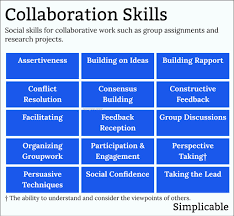Skills Examples for Students
As a student, developing a diverse set of skills is essential for your academic success and future career prospects. Here are some key skills examples that students can work on:
Communication Skills
Effective communication is crucial in both academic and professional settings. Students can improve their communication skills by practising active listening, public speaking, and writing clear and concise emails.
Time Management
Managing your time efficiently is important to balance your studies, extracurricular activities, and personal life. Students can enhance their time management skills by creating schedules, setting priorities, and avoiding procrastination.
Critical Thinking
Critical thinking involves analysing information, evaluating arguments, and making informed decisions. Students can develop this skill by questioning assumptions, considering different perspectives, and solving complex problems.
Teamwork
Collaboration is a valuable skill that students can cultivate through group projects, team sports, or volunteering activities. Working effectively in a team requires communication, compromise, and respect for others’ opinions.
Digital Literacy
In today’s digital age, being proficient in using technology is essential. Students should familiarise themselves with various software applications, online research tools, and social media platforms to enhance their digital literacy skills.
By actively working on these skills examples, students can become well-rounded individuals who are prepared to face the challenges of academia and the workforce.
Essential Skills for Students: Mastering Communication, Teamwork, and More
Communication
Effective communication is a fundamental skill that students should prioritise developing. By honing their ability to articulate thoughts clearly, actively listen to others, and express ideas concisely, students can enhance their academic performance and future career prospects. Strong communication skills not only facilitate better relationships with peers and teachers but also prepare students for success in professional environments where effective communication is key to collaboration and problem-solving.
Teamwork
Teamwork is a vital skill for students to develop as it teaches them the value of collaboration and collective effort. By working effectively in a team, students can learn how to communicate, delegate tasks, and contribute towards a common goal. Teamwork also fosters creativity, problem-solving abilities, and interpersonal skills, all of which are essential for success in both academic and professional environments. Emphasising teamwork not only enhances the learning experience but also prepares students for future endeavours where cooperation and mutual support are key to achieving shared objectives.
Time Management
Time management is a crucial skill for students to master as it enables them to effectively balance their academic responsibilities, extracurricular activities, and personal commitments. By learning how to prioritise tasks, set achievable goals, and allocate time wisely, students can avoid last-minute cramming sessions and reduce stress levels. Developing strong time management skills not only improves academic performance but also fosters a sense of discipline and self-control that will benefit students in all areas of their lives.
Problem Solving
Problem-solving is a crucial skill for students to develop as it empowers them to tackle challenges effectively and find innovative solutions. By honing their problem-solving skills, students can approach complex issues with confidence, analyse problems from different angles, and devise strategies to overcome obstacles. This skill not only enhances academic performance but also prepares students for real-world scenarios where critical thinking and creative problem-solving are highly valued. Encouraging students to practice problem-solving through puzzles, case studies, and group discussions can help them build resilience and adaptability in the face of adversity.
Adaptability
Adaptability is a crucial skill for students to cultivate as they navigate through their academic journey and prepare for the future. The ability to adjust to new situations, challenges, and environments is invaluable in today’s rapidly changing world. By being adaptable, students can embrace change with resilience, creativity, and a positive attitude. Whether it’s adapting to different learning styles, adjusting to unexpected circumstances, or exploring unfamiliar subjects, developing adaptability will not only enhance their academic performance but also equip them with the flexibility needed to thrive in various aspects of life.
Leadership
Developing leadership skills is crucial for students to excel both academically and in their future careers. By taking on leadership roles in student organisations, group projects, or extracurricular activities, students can enhance their ability to inspire and motivate others, make sound decisions, and effectively manage teams. Leadership skills also involve communication, problem-solving, and the ability to adapt to different situations. Students who actively work on honing their leadership skills will not only stand out in academic settings but will also be well-prepared for leadership roles in the professional world.

Leave a Reply